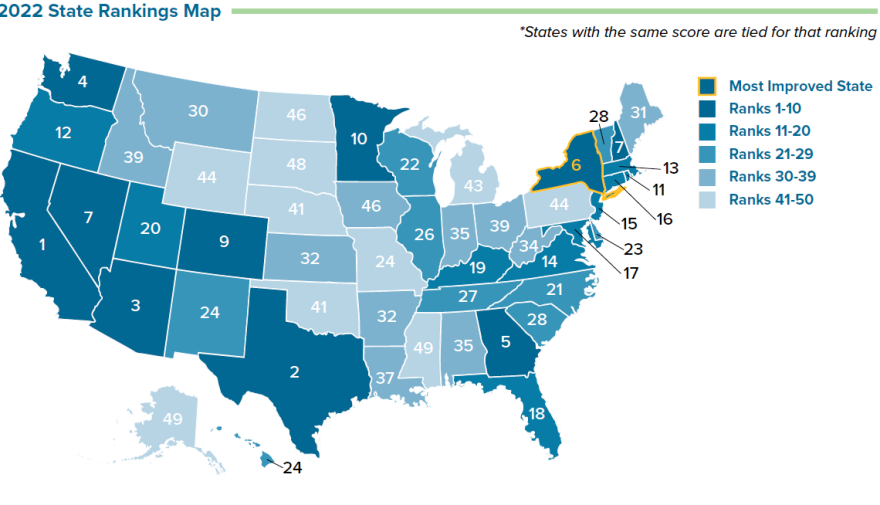News brief
As the West grapples with a long-running drought, a new report suggests states across the region can be doing a lot more to improve water efficiency and conservation.
L ast we ek, the nonprofit Alliance for Water Efficiency published a scorecard ranking states based on their laws and policies that promote the efficient use of water. It considers 23 different policies — from how states regulate water utilities to drought planning — and gives each state a score.
“This is not an evaluation of how much water a state uses or how much water per capita is used within a state,” said Ron Burke, AWE's president. “It's solely an evaluation of how well the states are supporting those local actors that really drive your local water services by providing them with financial support, by adopting policies that drive best practices and facilitating coordination across watersheds.”
California ranked No. 1 and Arizona No. 3. Nevada and Colorado landed in the top 10, with both scoring high for water conservation planning. But even those two states didn't score high. Out of a possible 89 points, Nevada got a 43.5 and Colorado a 42.5.

“What we see is that the Western states, in large part out of necessity, tend to be better than average,” Burke said. “Having said that, there's a lot of room for improvement across the board.”
The other states in the Mountain West region fell far behind, with Utah ranking 20th with 28 points and New Mexico tied for 24th with 20 points. Wyoming scored only five points, with the report calling it a "significant outlier" in the region.
The alliance last conducted its water efficiency scorecard in 2017. Progress since then, Burke said, has been “minimal,” as the average score for the states was 23 out of 89 possible points.
“Our states aren't doing much more than they did five years ago, and their commitment is really falling short of what's needed,” he said.
Burke said Western states can improve by encouraging the use of plumbing equipment that meets the EPA’s WaterSense requirements.
“There's tens of thousands of products that meet the water sense specifications,” Burke said. “They're readily available. They're already sold in most stores. And so this is low-hanging fruit.”
The alliance's report offers suggestions for each state, and Burke urges for action – especially in states in the Colorado River Basin.
“The long-term trend is towards less water availability and less predictability around when that water will be coming down out of the skies and available in the rivers and lakes and reservoirs,” he said. “So it's more important than ever that we use water efficiently. And I think if folks just communicate that to their elected officials, you know, that's when they hear that and they start looking for solutions.”
This story was produced by the Mountain West News Bureau, a collaboration between Wyoming Public Media, Nevada Public Radio, Boise State Public Radio in Idaho, KUNR in Nevada, the O'Connor Center for the Rocky Mountain West in Montana, KUNC in Colorado, KUNM in New Mexico, with support from affiliate stations across the region. Funding for the Mountain West News Bureau is provided in part by the Corporation for Public Broadcasting.
Copyright 2023 KUNC. To see more, visit KUNC. 9(MDA1MTkyNjA1MDEyNzM1MTQ0ODk3NTA1NA004))



